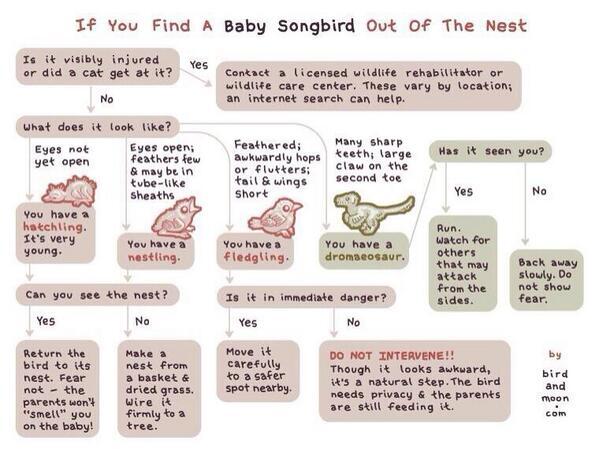 |
| (Credit to birdandmoon.com)
There is a lot of misinformation out there about baby birds, likely told with the best of intentions. Most people read this infographic and immediately respond 'if I touch a baby bird the parents will abandon the baby, the mom will smell me.'
Birds aren't the best at smelling, (though they can) but there is no evidence picking up a baby bird and putting it back in the nest will cause the parent to abandon it. When you find a bird who is very young (almost no feathers, or eyes closed) then they aren't ready to be on it's own yet and putting it back in its nest will probably help it survive.
If you find a baby bird who can't seem to fly, but has open eyes and lots of feathers, they are a 'bird in training' and while moving them off the sidewalk is probably helpful its important for them to bring on the ground so they can figure out the whole flying thing. Baby birds have a training period where they leave the nest and learn how to fly. This often means they spend a lot of time on the ground since they can't get back up in the tree. Their parents are still around feeding them, and if they seem to be making a lot of racket that's because they are hungry and they want mom and dad to be able to find them.
It can pull on your heart strings to leave a baby bird sitting under a bush when it appears to be abandoned, but if you take a step back (well probably several steps back) and watch for awhile mom and dad will return.
There are, of course, circumstances where a young bird does need help, if it has been injured, attacked by a cat, or if you have been watching it for more then a day and no one is feeding it then that bird needs help. If that happens you need to contact a wildlife rehaber. Rehabbers are specially trained to take care of injured birds, and they know what to feed them and how to help them heal. It's very important for baby birds eat the right things. Feeding them whatever you have around the house isn't going to help them and could very well hurt them. Many wildlife rehabers take on volunteers, so if you want to learn more about how to properly care for them, contact your local rehaber.
So do not fear if you find a little ball of feathers as you go about your day, just follow the handy diagram and act accordingly, nature is all around us and having the opportunity to see young animals up close is always special, but not always a reason to get involved. - Auriel |
Thursday, April 17, 2014
I found a baby bird! What do I do?
Its that time of year again! Across the northern hemisphere birds are raising their young and sometimes their young end up in unexpected places. This infographic from the birdandmoon.com provides a nice flow chart, with a good dash of humor, since not every baby bird you see needs your help.
Labels:
Baby Birds,
Smell,
Spring,
Wildlife Rehab
Subscribe to:
Post Comments (Atom)
Does this apply to birds of prey? My family once found baby owls that fell. They wound up not surviving, and I could never tell if it was because of the fall or because we had to move them (we didn't want them in the middle of the driveway in case of we had people come by).
ReplyDeleteIf they were very young, then them being on the ground was probably dangerous for them. Feral cats can be a big problem especially in residential areas. That being said, its hard to tell. Baby birds have a rough go in the best of circumstances (only about 50% of them survive the first year).
Delete